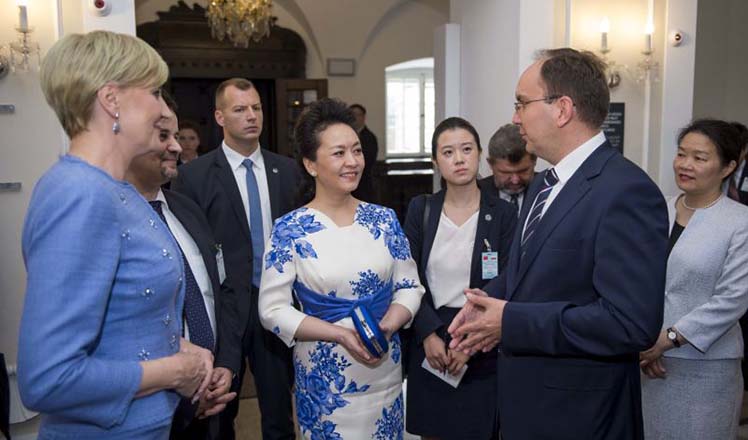Chinese physicists make quantum leap
Updated: 2016-06-23 08:08
By Wang Hongyi In Shanghai(China Daily USA)
|
||||||||
Chinese scientists have successfully revealed the mystery of the Majorana fermion, a special type of elementary particle, and their observations are likely to trigger a new round of work toward quantum computers.
In physics, the elementary particle is basic - the smallest known unit of matter. In general, each elementary particle has its own antiparticle.
Over the past eight decades, particle physicists around the world have invested a lot of energy in an effort to prove the existence of a special type of elementary particle, the Majorana fermion, or MF, which was suggested by Italian scientist Ettore Majorana in 1937.
Most recently, a research team led by Jia Jinfeng, a physicist at Shanghai Jiao Tong University, announced that it had lifted the veil of the mysterious MF by observing its tracks for the first time in the magnetic field vortices of a superconductor.
According to the research team, the specific spin of the polarized current caused by the MF has been clearly observed.
"The experimental data are strongly supported by the theoretical calculations. This work gives definite evidence for the existence of the MF," Jia said.
According to Jia, this is the first time researchers have observed the spin properties of the MF.
As a major breakthrough in the field of quantum physics, the discovery is expected to generate new avenues of research and MF application, especially the possibility of achieving advanced quantum computing using solid state materials.
Unlike an ordinary computer, which processes data in binary mode, a quantum computer deals with data based on a quantum physics mechanism at incredible speeds.
For example, quantum computing could significantly increase the accuracy of weather forecasting and carry out systematic, precise and efficient calculation on various new materials, bringing revolutionary progress in materials science.
So far scientists have failed to develop a quantum computer because of the unstable state of the particles. Electromagnetic interference or physical interference can easily disturb calculations.
"Protected by the topological order, the MF is very stable. These properties may become key factors in developing topological quantum computing," said Wang Xi, an academician at the Chinese Academy of Sciences.
The research was published in Physical Review Letters online.
wanghongyi@chinadaily.com.cn

(China Daily USA 06/23/2016 page4)
- US Ambassador to China Baucus says he is a 'WeChat nut'
- Classes inspired by ancient arts offer moral teachings
- School's artificial grass found to be highly toxic
- Agency lists tiny hallway for sale: 1.5 million yuan
- Armed police mend gap in E China river defenses
- Over 90% Chinese netizens access news on mobile phones: report
- US urged not to rock the boat by flexing its muscles
- UK's EU referendum polls show 'Leave', 'Remain' tied up
- DPRK yet to confirm suspected missile launches
- Chinese panda expert concerned by sick panda in US
- British MPs pay tribute to murdered MP Jo Cox
- DPRK deploys Musudan ballistic missile in east coast
 Rising above the clouds: Mist envelops Qingdao
Rising above the clouds: Mist envelops Qingdao
 In pictures: Countdown to Brexit referendum
In pictures: Countdown to Brexit referendum
 Top 10 classic Walt Disney animated films
Top 10 classic Walt Disney animated films
 Top 10 overseas M&As of Chinese auto companies
Top 10 overseas M&As of Chinese auto companies
 Now and then: Famous venues of the Long March
Now and then: Famous venues of the Long March
 Things you may not know about Summer Solstice
Things you may not know about Summer Solstice
 First lady visits Fryderyk Chopin Museum in Poland
First lady visits Fryderyk Chopin Museum in Poland
 Chinese factories score a goal with Euro 2016
Chinese factories score a goal with Euro 2016
Most Viewed
Editor's Picks

|

|

|

|

|

|
Today's Top News
Abe's blame game reveals his policies failing to get results
Ending wildlife trafficking must be policy priority in Asia
Effects of supply-side reform take time to be seen
Chinese State Councilor Yang Jiechi to meet Kerry
Chinese stocks surge on back of MSCI rumors
Liang avoids jail in shooting death
China's finance minister addresses ratings downgrade
Duke alumni visit Chinese Embassy
US Weekly

|

|